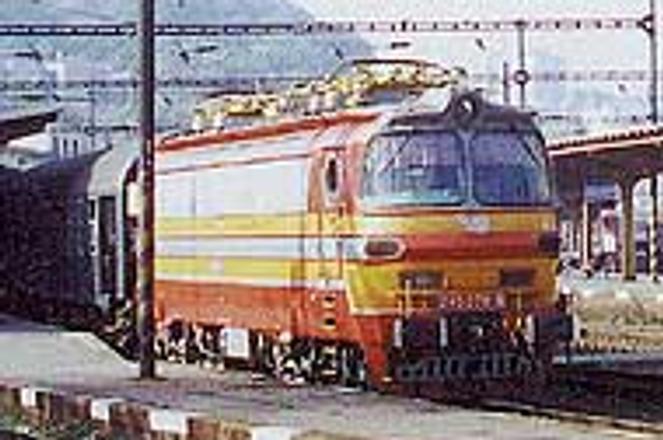BRATISLAVA regional government officials all aboard to operate local rail routes.photo: Ján Svrček
PASSENGER transport on a number of the 25 local rail lines on which service was cancelled in January will resume in mid-June, but Slovakia's rail companies and unions have still not resolved key issues behind railway workers' three-day strike early this year.
Although resuming operations on nine regional routes will cost the ZSSK train operator an estimated Sk50 million (Ř1.2 million) this year, company spokesperson Miloš Čikovský said the routes were chosen in regions with poor transportation networks, and where there were good chances of increasing efficiency.
"The directors of ZSSK and the Transport Ministry had assured [unions] during the strike that they would take the situation into consideration and would re-evaluate these lines," said Čikovský on May 13.
The move to reopen the lines has been greeted with caution by railway unions, who are still pushing ZSSK for an 8 percent pay rise they say they are due this year according to their 2002 collective agreement. Railway unions also fear further job cuts as the government tries to rein in spending and reduce the rail companies' Sk50 billion (Ř1.2 billion) debt.
"In ZSSK, they found internal resources, and the company is able to reintroduce transport on some of the [cancelled] lines. The lines considered for renewal were those with the lowest losses," said Jozef Schmidt, chairman of the railway workers' union.
"We will try in the near future to call together the central strike committee and we will evaluate this step, after which we will announce our position," said Schmidt.
Dealing with long-term debt was one of the key reasons for the government's cutbacks at the railway, rolled out following last September's parliamentary elections, as well as transformation measures initiated under the previous government.
The ŽSR state rail company, along with its accumulated debt from 1994 to 2002, was split into two firms in early 2002, leaving ŽSR in charge of Slovakia's rail network and ZSSK running the country's trains.
"The total debt of the railway companies is around Sk50 billion (Ř1.2 billion), while the government owes them Sk13.6 billion (Ř330 million)," Finance Minister Ivan Mikloš told journalists after a May 12 meeting of cabinet ministers on plans for the railway.
"The project of restructuring and transforming ŽSR includes clearing these claims and obligations. Since the better portion of ŽSR's loans are state-guaranteed, in the end they are the obligation of the government," said Mikloš.
"Through the tight control of this project, as well as the change in relations within the railway companies, we want to solve the old debt and simultaneously create conditions that will prevent the creation of new [debt]," he said.
Mikloš also said that the government would have to subsidise some loss-making passenger transport activities, but that the railway companies would have to cut costs, increase efficiency, and establish deregulated ticket prices according to market realities.
While the state train company is reopening some local lines, another model for reviving cancelled rail transport has already been pioneered in the west of Slovakia, with the Bratislava regional government establishing the Bratislava Regional Rail Company (BRKS) in mid-May.
The company will operate passenger and freight traffic on the Zohor-Záhorská Ves and Zohor-Plavecký Mikuláš rail lines north of the Slovak capital.
"[The rail companies] hold the opinion that the rail infrastructure should be held by only one operator, which should be ŽSR," said BRKS chairman and head of Bratislava regional government's transport section Roman Filistein.
"We are coming from the point of view that regional tracks should come under the direction and ownership of the regional governments that request them, or city and municipal governments that have an interest in them," said Filistein.
Other regional governments have also expressed interest in operating local lines. The eastern Košice region is reportedly in negotiations for control of the Spišská Nová Ves-Levoča line, and central Slovakia's Banská Bystrica region has inquired about the possible operation of the Hronská Dúbrava-Banská Štiavnica line.
While no deals with other regions have yet been reached, Bratislava officials say that local control of rail lines will mean more efficient rail operations and will benefit populations using the trains.
"A region knows its own needs in the area of rail transport better than state organs," said Ľubomír Roman, head of the Bratislava regional government.
"Because of that we founded a transport company that will secure transportation for our citizens on regional rail lines," he said.
Passenger railway service will remain suspended on these lines:
117 Jablonica - Brezová pod Bradlom
124 Nemšová - Lednické Rovne
136 Komárno - Kolárovo
141 Lužianky - Kozárovce
142 Zbehy - Radošina
144 Prievidza - Nitrianske Pravno
161 Lučenec - Kalonda
163 Breznička -Katarínska Huta
166 Plešivec - Slavošovce
167 Rožňava - Dobšiná
168 Moldava nad Bodvou - Medzev
175 Poltár - Rimavská Sobota
186 Spišská Nová Ves - Levoča
192 Trebišov - Humenné
Passenger railway service will resume on these lines as of June 15:
112 Zohor - Plavecký Mikuláš *
113 Zohor - Záhorská Ves *
126 Žilina - Rajec **
134 Šaľa - Neded
143 Trenčín - Chynorany
151 Zlaté Moravce - Úľany nad Žitavou
152 Levice - Štúrovo
153 Zvolen - Čata
154 Hronská Dúbrava - Banská Štiavnica
165 Plešivec - Muráň
195 Bánovce nad Ondavou - Veľké Kapušany
* operated by BRKS
** service resumed May 1


